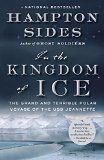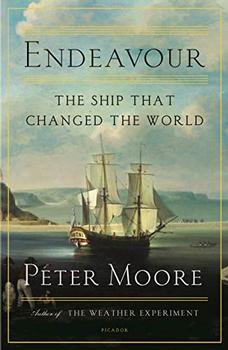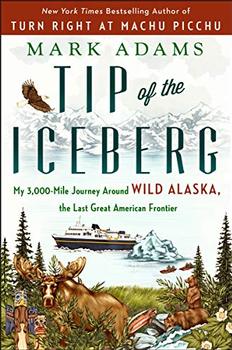Summary | Excerpt | Reviews | Beyond the book | Read-Alikes | Genres & Themes | Author Bio

The Grand and Terrible Polar Voyage of the USS Jeannette
by Hampton SidesVoted 2014 Best Nonfiction by BookBrowse's Members
In the Kingdom of Ice relays the story of the USS Jeannette and her crew as they sought to be the first to travel to the North Pole. Departing from San Francisco in 1879, the ship sailed beyond the Bering Strait into the Arctic Ocean, where they got locked in the ice near Wrangel Island. The ship and crew drifted with the ice pack for nearly two years before the Jeannette finally sank. Veteran author Hampton Sides goes on to relate the epic journey of the ship's captain George Washington De Long and his men as they set off across the tundra in search of refuge.
Whenever one reads about early exploration, the question naturally arises as to why someone would want to brave horrendous conditions (not to mention life and limb) to embark on such a quest. One of the strengths of this work is that the author successfully conveys the psychology behind such a decision. According to Sides:
Some of the attraction was generational: Most of the applicants, like De Long, had just missed out on the greatest conflict in American history. These young men thirsted for some of the glory their fathers had won on the battlefields of the Civil War, and they yearned to test their manhood in some daunting and adventurous endeavor...
A few of the applicants had been to the Arctic before and had fallen in love with its strange light, its howling solitudes, its haunting and beautiful otherness. These were men who, like De Long, had been touched by a kind of polar madness and, for reasons they often could not fully explain, had to go back.
Then there was the essential allure of exploration itself. It was impossible to exaggerate how significant, how glorious, how glamorous the Jeannette expedition seemed to certain quarters of the American public. Add to all this the element of nationalism — of beating other countries to the pole — and De Long's voyage exerted an irresistible pull on a certain kind of young man.
The author goes on to display a keen understanding of how such individuals react when faced with the various hardships of this type of long expedition, particularly as increasingly dire circumstances arise.
The book is obviously well-researched; the author goes well beyond studying materials others have collected, choosing to travel to the most remote locales mentioned in the story and obtaining source material (much of it previously unknown) directly from modern-day relatives of those involved. Sides' first-hand knowledge of the environs provides another layer of authenticity to an already exceptionally well-written narrative.
I particularly enjoyed his illustration of both the good and bad science that went into the planning of this expedition, and how the timing of advancing knowledge impacted its success. For example, when the Jeannette departed the United States, popular scientific opinion was that an ocean current that runs near the coast of Asia, the Kuro Siwo, flowed strongly into the Arctic Ocean, creating a warm "river" that a ship could follow all the way to the northernmost regions of the planet. It was further speculated that this warm water prevented the Arctic Ocean from ever freezing, and after crossing a "girdle" of ice one would encounter open — perhaps even tropical — seas. So De Long expected to eventually reach ice-free water near the pole, but while he was at sea, U.S. scientists debunked this theory. Had the Jeannette left a year or two later, its ultimate fate may have been very different.
I found the book fairly engaging initially, but by its mid-point it was down-right unputdownable; the tension built as the crew encountered one obstacle after another, and toward the end of the narrative I could barely keep from skimming because I was so anxious to find out the fate of these brave adventurers. Excerpts of letters from Emma De Long to her husband, which start many a chapter, add a note of poignancy. "She diligently wrote letters to George," Sides states, "knowing that they probably would never reach him; she called them her 'letters to nowhere,' and they became a therapeutic ritual. She penned them in triplicate so that they could be sent to multiple Arctic locations at once — whaling and trading outposts in Alaska, Greenland, and Spitsbergen, Norway." Unfortunately, only a few early letters made it into the hands of her husband. Interestingly, Arctic explorer Robert Peary discovered one of these letters, still sealed, in a remote hut in Greenland twenty years after it was penned.
My main (and minor) criticism is that it felt like a long time to get to the actual voyage. The initial portions, about the expedition's backer James Gordon Bennett, Jr., an Arctic enthusiast and the publisher of The New York Herald, were quite interesting, but I was impatient to get to the action. I also question the author's objectivity; he paints a positive picture of De Long and the actions he took, but acknowledges that "the Jeannette expedition became the subject of a naval court of inquiry and a congressional hearing that produced considerable controversy" and that conflicting histories of the journey emerged. I would have liked to have known more about these "controversies and conflicts" he merely mentions in passing.
There are a number of excellent books about Arctic exploration, and In the Kingdom of Ice is certainly one of the finer ones. It's a must-read for those who enjoy this genre, and anyone looking for a real-life action/adventure book will want to pick up a copy.
![]() This review was originally published in The BookBrowse Review in August 2014, and has been updated for the
June 2015 edition.
Click here to go to this issue.
This review was originally published in The BookBrowse Review in August 2014, and has been updated for the
June 2015 edition.
Click here to go to this issue.

If you liked In the Kingdom of Ice, try these:

by Peter Moore
Published 2020
An unprecedented history of the storied ship that Darwin said helped add a hemisphere to the civilized world.

by Mark Adams
Published 2019
From the acclaimed, bestselling author of Turn Right at Machu Picchu, a fascinating and funny journey into Alaska, America's last frontier, retracing the historic 1899 Harriman Expedition.
Your guide toexceptional books
BookBrowse seeks out and recommends the best in contemporary fiction and nonfiction—books that not only engage and entertain but also deepen our understanding of ourselves and the world around us.